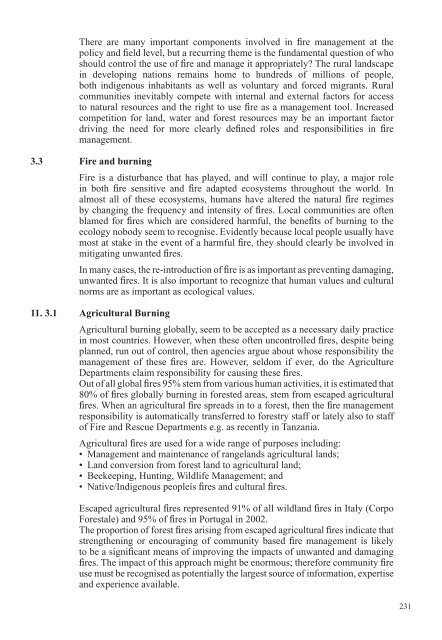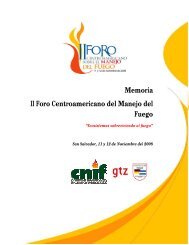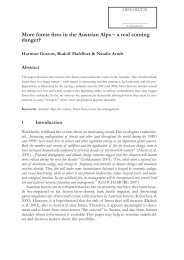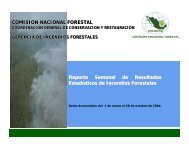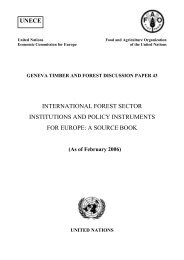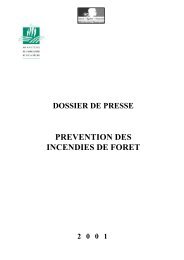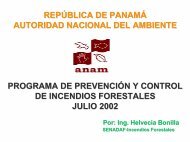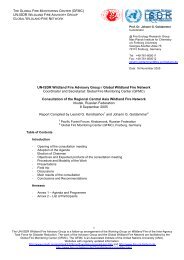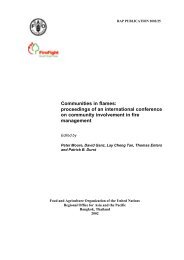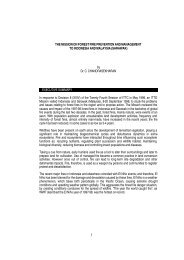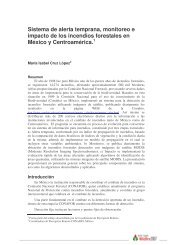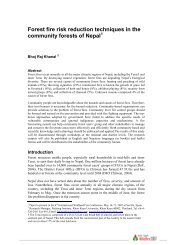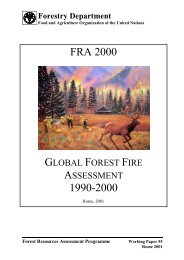Wildland Fire Management: Handbook for Trainers - The Global Fire ...
Wildland Fire Management: Handbook for Trainers - The Global Fire ...
Wildland Fire Management: Handbook for Trainers - The Global Fire ...
You also want an ePaper? Increase the reach of your titles
YUMPU automatically turns print PDFs into web optimized ePapers that Google loves.
<strong>The</strong>re are many important components involved in fi re management at the<br />
policy and fi eld level, but a recurring theme is the fundamental question of who<br />
should control the use of fi re and manage it appropriately? <strong>The</strong> rural landscape<br />
in developing nations remains home to hundreds of millions of people,<br />
both indigenous inhabitants as well as voluntary and <strong>for</strong>ced migrants. Rural<br />
communities inevitably compete with internal and external factors <strong>for</strong> access<br />
to natural resources and the right to use fi re as a management tool. Increased<br />
competition <strong>for</strong> land, water and <strong>for</strong>est resources may be an important factor<br />
driving the need <strong>for</strong> more clearly defi ned roles and responsibilities in fi re<br />
management.<br />
3.3 <strong>Fire</strong> and burning<br />
<strong>Fire</strong> is a disturbance that has played, and will continue to play, a major role<br />
in both fi re sensitive and fi re adapted ecosystems throughout the world. In<br />
almost all of these ecosystems, humans have altered the natural fi re regimes<br />
by changing the frequency and intensity of fi res. Local communities are often<br />
blamed <strong>for</strong> fi res which are considered harmful, the benefi ts of burning to the<br />
ecology nobody seem to recognise. Evidently because local people usually have<br />
most at stake in the event of a harmful fi re, they should clearly be involved in<br />
mitigating unwanted fi res.<br />
In many cases, the re-introduction of fi re is as important as preventing damaging,<br />
unwanted fi res. It is also important to recognize that human values and cultural<br />
norms are as important as ecological values.<br />
11. 3.1 Agricultural Burning<br />
Agricultural burning globally, seem to be accepted as a necessary daily practice<br />
in most countries. However, when these often uncontrolled fi res, despite being<br />
planned, run out of control, then agencies argue about whose responsibility the<br />
management of these fi res are. However, seldom if ever, do the Agriculture<br />
Departments claim responsibility <strong>for</strong> causing these fi res.<br />
Out of all global fi res 95% stem from various human activities, it is estimated that<br />
80% of fi res globally burning in <strong>for</strong>ested areas, stem from escaped agricultural<br />
fi res. When an agricultural fi re spreads in to a <strong>for</strong>est, then the fi re management<br />
responsibility is automatically transferred to <strong>for</strong>estry staff or lately also to staff<br />
of <strong>Fire</strong> and Rescue Departments e.g. as recently in Tanzania.<br />
Agricultural fi res are used <strong>for</strong> a wide range of purposes including:<br />
• <strong>Management</strong> and maintenance of rangelands agricultural lands;<br />
• Land conversion from <strong>for</strong>est land to agricultural land;<br />
• Beekeeping, Hunting, Wildlife <strong>Management</strong>; and<br />
• Native/Indigenous peopleís fi res and cultural fi res.<br />
Escaped agricultural fi res represented 91% of all wildland fi res in Italy (Corpo<br />
Forestale) and 95% of fi res in Portugal in 2002.<br />
<strong>The</strong> proportion of <strong>for</strong>est fi res arising from escaped agricultural fi res indicate that<br />
strengthening or encouraging of community based fi re management is likely<br />
to be a signifi cant means of improving the impacts of unwanted and damaging<br />
fi res. <strong>The</strong> impact of this approach might be enormous; there<strong>for</strong>e community fi re<br />
use must be recognised as potentially the largest source of in<strong>for</strong>mation, expertise<br />
and experience available.<br />
231


